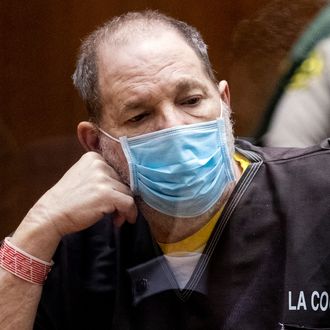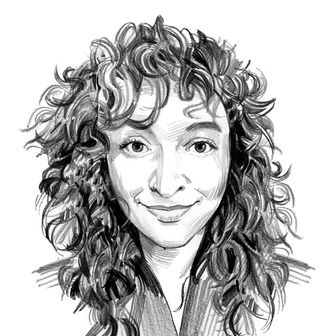
Harvey Weinstein was in a “stranglehold” during his trial because prosecutors were allowed to discuss a number of accusations that had nothing to do with the charges, a lawyer for the disgraced producer claimed on Wednesday in Manhattan appeals court. “The jury was overwhelmed by such prejudicial, bad evidence. This was a trial of Harvey Weinstein’s character — that people were making him out to be a bad person,” Barry Kamins told a five-judge panel of the Appellate Division, First Judicial Department. “Even if the [prosecution] had successfully identified a proper basis for admission of prior acts — which it did not — [the] probative value was clearly outweighed by its prejudicial effect.”
“He was in a legal vise in this case,” Kamins said.
Weinstein was convicted of criminal sexual act in the first degree and rape in the third degree on February 24, 2020, after a nearly seven-week trial. He was found guilty of sexually assaulting two women: Jessica Mann and Mimi Haleyi. Mann, who once aspired to be an actress, said during her testimony that Weinstein raped her at a Midtown East hotel in early 2013. Haleyi testified that Weinstein used force to perform oral sex on her in the summer of 2006 at his Soho apartment.
Weinstein, now 69, was found not guilty of one first-degree-rape count and two predatory-sexual-assault counts. On March 11, 2020, Justice James Burke sentenced Weinstein to 23 years in prison. Weinstein’s lawyers filed their appeal on April 5, 2021, fighting both his conviction and sentence. Their argument, both in the appeals paperwork and today’s proceedings, are largely based on claims that Burke was wrong to allow prosecutors to introduce so much evidence about Weinstein’s alleged prior bad acts. These uncharged allegations of sexual misconduct included testimony from Dawn Dunning, Tarale Wulff, and Lauren Young.
“As a result, Mr. Weinstein was tried not only for alleged criminal acts charged in the indictment, but also for his alleged propensity to behave in ways that evinced licentiousness in his relationships with women,” Weinstein’s lawyers wrote in their nearly 190-page appeal. Valerie Figueredo, an appeals attorney with the Manhattan District Attorney’s Office, argued that testimony from Young, Dunning, and Wulff was “directly probative of [Weinstein’s] state of mind.”
“It indicated his knowledge that the women were not consenting to sexual acts simply because they had agreed to be alone with him, simply because they had come to him for professional assistance,” she said. Judges on the panel repeatedly pressed Figueredo to explain how bringing in so many uncharged bad acts didn’t tilt the scales against Weinstein. “Here come three other women who claim I did the same thing to them, but I’m not being charged with that — that’s prejudicial,” one judge remarked. “You know what? There are trials every day where we have defendants who have a rap sheet a mile long — a mile long; they’ll have 20 felony convictions on their rap sheet — and I’ve seen no judge say, ‘Go ahead; go to town on all of them,’” another judge commented, seemingly expressing skepticism over how much Burke allowed. “They usually just let one or two in.”
Weinstein’s lawyers have also claimed that Burke erred in letting a woman sit on the jury who had written a novel that involved predatory older men. They contended in appeals papers that Weinstein was “denied his constitutional right to be tried by an impartial jury” as a result of this juror.
“Juror No. 11’s fixation with matters of consent and predatory older men, and her lack of candor about it, raises troubling questions about whether she prejudged Mr. Weinstein’s guilt and whether she had a personal agenda to see him convicted,” they argued in appeals papers. They claimed her presence “single-handedly obliterated” the judicial process. “When this judge refused to discharge this juror, it was a reversible error,” Kamins said during today’s proceedings.
Weinstein is currently jailed in Los Angeles, where he is facing sexual-assault charges.


